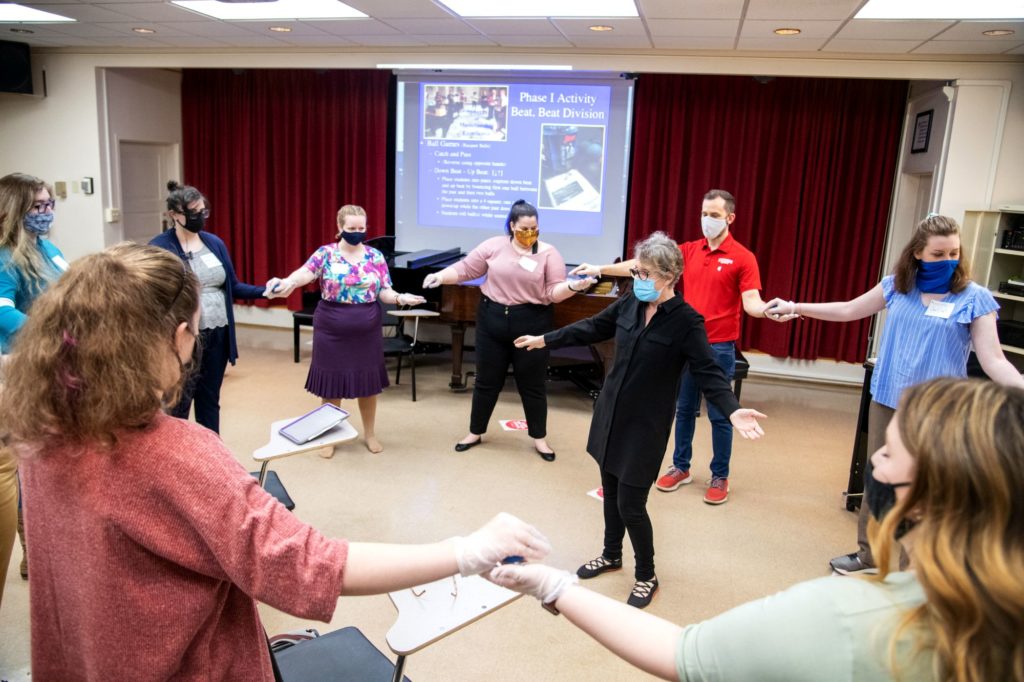
While the COVID-19 pandemic imposed many restrictions on how the University of Lynchburg operates, it also opened up opportunities for student professional development in music education.
Before the pandemic, it was sometimes hard to recruit experts to speak in person at many of the workshops and seminars the major offered. With the advent of video conferencing, they can now ask anyone to teach the students something new, says music instructor Jeremy Craft ’12 MEd, ’16 MA.
Craft said they chose to make the focus of the 2020-21 academic year professional development for students. That included a series of workshops with hands-on activities for students and panel discussions with three to four experts.
“All these programs were driven either because students have said these are things they want to learn more about or we see things we want our students to learn about from other teachers and professors. These are really driven by the student voices,” Craft said.
The workshops have included a West Virginia teacher who virtually taught the basics of playing the ukulele, which she implements in her curriculum.
“It’s something that has become a trend because they are cheap and work well for little kids. A lot of our students already have them,” Craft said.
Kenneth Brand ’10, the band director at Sandusky Middle School in Lynchburg, also taught a workshop on how to get into podcasting after being featured in The News and Advance, and Dr. Carol Krueger, an author and former director of choral activities at Valdosta State University, taught music literacy using games and an “active process.”
“Aside from the fact they will be [teaching] the rest of their lives, they don’t graduate and know how to do everything. We are learning how to be better for our students,” Craft said.
Alison Horton ’22, a music education major and president of Lynchburg’s chapter of the Collegiate Virginia Music Educators Association (CoVMEA), facilitates the workshops and said they are very important for all music education students.

“These discussions are important because they provide us with information we might not learn in our required courses,” she said. “These workshops allow us to connect with our fellow music education students and with experts in the field of music education. In all jobs, there are things that you have to learn as you go.”
She added Krueger’s was her favorite workshop so far.
“Dr. Krueger guided us through several rhythm activities that we can use with our future students. I have already used some of these activities in my own vocal practice,” Horton said.
Music education major Madison Bakalov ’24 said she loved learning so many new ideas and couldn’t pick one favorite workshop.
“These workshops truly benefit what I’m working towards. I’m learning a lot about the different aspects of music and education. It’s definitely preparing me for the ‘real world,’” Bakalov said. “There is so much we don’t get to see being students, let alone during COVID-19 times, but this is helping us see how the real world for music education operated before quarantine and now during the quarantine.”
Alongside the workshops, CoVMEA integrated virtual panel discussions into its monthly meetings, including topics of teaching music virtually, choosing a graduate school, interdisciplinary teaching, creating and managing a program budget, and diversity in music education.
“We can’t normally bring in teachers from the field in the middle of the day. So, we built the panel discussions around topics our students wanted to know more about,” Craft said. “We polled students and asked what they wanted to know about and invited anyone who had a voice on topics like choosing a major, finances post-graduation, fundraising for school trips, and cross-discipline teaching.”
All the discussions occurred through video chats and usually had four to six in-service music teachers or specialists.
“We wanted to continue to give students opportunities for professional development to build their own repertoire, and gain skills they might not get in their undergraduate,” Craft said, adding that content knowledge alone isn’t what’s most important.
“We know, especially now with COVID-19, there’s a lot of burnout. We wanted to make sure they had knowledge of self-care.”

